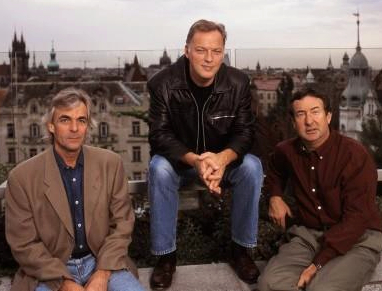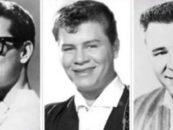In the mid-1980s, following the band’s The Final Cut album in 1983, it seemed as if for all intents and purposes, Pink Floyd had broken up. David Gilmour released his second solo LP, About Face, in 1984. Roger Waters announced he was leaving the band and released his first solo album, The Pros and Cons of Hitch Hiking, that same year. Richard Wright embarked on a side project, Zee, which also put out a 1984 album. Nick Mason issued his second solo disc the next year.
Waters began to make legal moves to dissolve the partnership. Then, on November 11, 1986, Gilmour announced that he and Mason (and later Wright) were going to make a new Pink Floyd album. Waters sued to block them from using the band name on the LP, A Momentary Lapse of Reason, insisting that all four band members had to agree on any use of the Pink Floyd name. However, partnership law left him with no power to stop them from using the group’s name, material and assets.
Eventually, on Christmas Eve 1987, an agreement was reached after a meeting on Gilmour’s houseboat. Gilmour, Mason and Wright could continue to use the Pink Floyd name, but Waters retained full rights to The Wall concept. The four members did reunite one more time in 2005 for the Live 8 concert.
Gilmour, Mason and Wright made two more Pink Floyd albums: 1994’s The Division Bell, and finally in 2014 The Endless River, a collection of snippets and outtakes as the final Pink Floyd release in tribute to Wright, who died in 2008.
2017 saw the release of Waters’ first new studio rock album in 25 years, Is This the Life We Really Want? In 2020, he released his Us + Them live release. Waters continued his latest tour, “This Is Not a Drill,” in 2023.
Gilmour released Live at Pompeii, which documented his two return performances at the historic site in Italy. He had a burst of activity in 2024 with a new studio album, Luck and Strange [available in the U.S. here and in the U.K. here] and accompanying tour. [We reviewed one of his shows at the Hollywood Bowl.] A year later, he issued a pair of souvenirs from that tour. The Live at the Circus Maximus, Rome film was released on 2-Blu-ray and 3-DVD sets with bonus unseen footage, mixed in 5.1 and Atmos (Blu-ray only). Both formats are available in the U.S./worldwide here, in Canada here and in the U.K. here.
Mason has a band, Saucerful of Secrets, performing early Floyd, which included an onstage reunion with Waters in 2019. Mason released a live collection in 2020 and had a lengthy tour in 2022. When he returns to the stage, tickets are available here.
Pink Floyd’s 1975 album, Wish You Were Here, received 50th anniversary editions in 2025. They’re available in the U.S./worldwide here, in Canada here and in the U.K. here.
Related: Our look back at Pink Floyd’s early years







3 Comments so far
Jump into a conversationAfter the shameful way Waters treated Wright during “The Wall” sessions, it’s easy to see why the other members wanted to go on without Waters. He did them a favor by leaving the band, which otherwise probably couldn’t have continued to exist. I always got the feeling that for the rest of Wright’s life, Gilmore game him his loyalty as an attempt to make things up to him, for how he was unfairly treated by the band through Waters. It’s really difficult to imagine how Wright could have ever been treated with such disrespect by Waters, considering that it was his innovative keyboard sounds and parts through the years that were directly responsible for much of Pink Floyd’s musical innovativeness and subsequent success album after album, not to mention the iconic Floyd songs he’d written.
On the one hand, it’s really not quite Pink Floyd without Roger Waters. On the other hand, “A Momentary Lapse Reason” was SO much better than the downright depressing “The Final Cut”, an album in which we BARELY hear the best voice in the band – that would be Gilmour, just to clarify – used at all.
Being a musician myself and having played in many different bands I’ve coined a phrase for people like Waters who believe they have ascended above everyone else. It’s called the God Syndrome. It never works out very well…